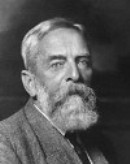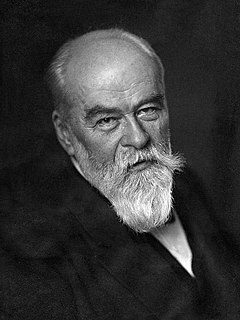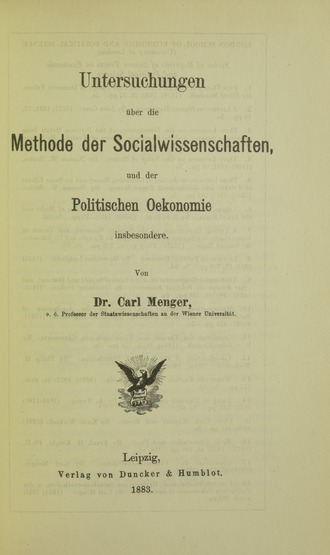The Austrian School is a heterodox school of economic thought that is based on methodological individualism, the concept that social phenomena result exclusively from the motivations and actions of individuals.

Carl Menger von Wolfensgrün was an Austrian economist and the founder of the Austrian School of economics. Menger contributed to the development of the theories of marginalism and marginal utility, which rejected cost-of-production theory of value, such as developed by the classical economists such as Adam Smith and David Ricardo. As a departure from such, he would go on to call his resultant perspective, the subjective theory of value.

Friedrich August von Hayek, often referred to by his initials F. A. Hayek, was an Austrian-British economist, and philosopher who is best known for his defence of classical liberalism. Hayek shared the 1974 Nobel Memorial Prize in Economic Sciences with Gunnar Myrdal for their work on money and economic fluctuations, and the interdependence of economic, social and institutional phenomena. His account of how changing prices communicate information that helps individuals coordinate their plans is widely regarded as an important achievement in economics, leading to his prize.

Eugen Ritter von Böhm-Bawerk was an Austrian economist who made important contributions to the development of the Austrian School of Economics and neoclassical economics. He served intermittently as the Austrian Minister of Finance between 1895 and 1904. He also wrote extensive criticisms of Marxism.

Principles of Economics is a book by economist Carl Menger which is credited with the founding of the Austrian School of economics. It was one of the first modern treatises to advance the theory of marginal utility.
The historical school of economics was an approach to academic economics and to public administration that emerged in the 19th century in Germany, and held sway there until well into the 20th century. The professors involved compiled massive economic histories of Germany and Europe. Numerous Americans were their students. The school was opposed by theoretical economists. Prominent leaders included Gustav von Schmoller (1838–1917), and Max Weber (1864–1920) in Germany, and Joseph Schumpeter (1883–1950) in Austria and the United States.

Friedrich Freiherr von Wieser was an early economist of the Austrian School of economics. Born in Vienna, the son of Privy Councillor Leopold von Wieser, a high official in the war ministry, he first trained in sociology and law. In 1872, the year he took his degree, he encountered Austrian-school founder Carl Menger's Grundsätze and switched his interest to economic theory. Wieser held posts at the universities of Vienna and Prague until succeeding Menger in Vienna in 1903, where along with his brother-in-law Eugen von Böhm-Bawerk he shaped the next generation of Austrian economists including Ludwig von Mises, Friedrich Hayek and Joseph Schumpeter in the late 1890s and early 20th century. He was the Austrian Minister of Commerce from August 30, 1917, to November 11, 1918.
Ludwig Maurits Lachmann was a German economist who became a member of and important contributor to the Austrian School of economics. He is one of the three main catalysts who ushered in the Austrian 'revival', beginning in 1974. He wrote on economic theory, history, and methodology, as well as exploring a hermeneutical approach to economic analysis.
The Ludwig von Mises Institute for Austrian Economics, or Mises Institute, is a libertarian nonprofit think tank located in Auburn, Alabama, United States. It is named after Austrian School economist Ludwig von Mises (1881–1973).

Gustav FriedrichSchmoller was the leader of the "younger" German historical school of economics.

Human Action: A Treatise on Economics is a work by the Austrian economist and philosopher Ludwig von Mises. Widely considered Mises' magnum opus, it presents the case for laissez-faire capitalism based on praxeology, his method to understand the structure of human decision-making. It rejects positivism within economics. It defends an a priori epistemology and underpins praxeology with a foundation of methodological individualism and laws of apodictic certainty. Mises argues that the free-market economy not only outdistances any government-planned system, but ultimately serves as the foundation of civilization itself.
In philosophy, praxeology or praxiology is the theory of human action, based on the notion that humans engage in purposeful behavior, as opposed to reflexive behavior and other unintentional behavior.
Criticism of socialism is any critique of socialist models of economic organization and their feasibility as well as the political and social implications of adopting such a system. Some critiques are not directed toward socialism as a system, but rather toward the socialist movement, parties or existing states. Some critics consider socialism to be a purely theoretical concept that should be criticized on theoretical grounds while others hold that certain historical examples exist and that they can be criticized on practical grounds. Because there are many models of socialism, most critiques are focused on a specific type of socialism and the experience of Soviet-type economies that may not apply to all forms of socialism as different models of socialism conflict with each other over questions of property ownership, economic coordination and how socialism is to be achieved. Critics of specific models of socialism might be advocates of a different type of socialism.

Adolph Wagner was a German economist and politician, a leading Kathedersozialist and public finance scholar and advocate of agrarianism. Wagner's law of increasing state activity is named after him.

Jesús Huerta de Soto Ballester is a Spanish economist of the Austrian School. He is a professor in the Department of Applied Economics at King Juan Carlos University of Madrid, Spain and a Senior Fellow at the Mises Institute.

The Theory of Money and Credit is a 1912 economics book written by Ludwig von Mises, originally published in German as Theorie des Geldes und der Umlaufsmittel. In it Mises expounds on his theory of the origins of money through his regression theorem, which is based on logical argumentation. It is one of the foundational works of the Misesian branch of the Austrian School of economic thought.

Ludwig Heinrich Edler von Mises was an Austrian School economist, historian, logician, and sociologist. Mises wrote and lectured extensively on the societal contributions of classical liberalism. He is best known for his work on praxeology studies comparing communism and capitalism. He is considered one of the most influential economic and political thinkers of the 20th century.

Frank Albert Fetter was an American economist of the Austrian School. Fetter's treatise, The Principles of Economics, contributed to an increased American interest in the Austrian School, including the theories of Eugen von Böhm-Bawerk, Friedrich von Wieser, Ludwig von Mises and Friedrich Hayek.
In economics, utility is the satisfaction or benefit derived by consuming a product; thus the marginal utility of a good or service describes how much pleasure or satisfaction is gained from an increase in consumption. It may be positive, negative, or zero. For example, purchasing more than one needs brings little satisfaction as the purchaser feels it is wasted money, hence zero marginal utility. If one is actually harmed by extra consumption then it is negative, and if some satisfaction is gained by extra consumption then it is positive. In other words, a negative marginal utility suggests that each additional unit of a good consumed provides more harm than benefits and leads to a lower level of overall utility, whereas a positive marginal utility suggests each additional unit consumed provides more benefit and leads to a higher level of overall utility.












